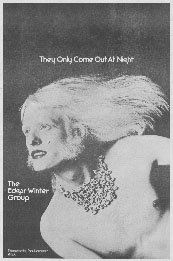![]()
  |

They Only Come Out at Night
The Edgar Winter Group
Epic 31584
Released: November 1972
Chart Peak: #3
Weeks Charted: 80
Certified Double Platinum: 11/21/86


 Like Mark Farner and Alice Cooper, Edgar Winter understands that rock & roll is vaudeville; the goal is to keep the customers satisfied. What he lacks in charisma, Edgar makes up for in talent. In concert he has traveled the low hard road of loud, high energy rock, and his band stands alongside J. Geils as the prime American entertainers for what's left of the hard rock mob. His forté has been the instrumental solo, the shrieking vocal, and the endless deafening riff.
Like Mark Farner and Alice Cooper, Edgar Winter understands that rock & roll is vaudeville; the goal is to keep the customers satisfied. What he lacks in charisma, Edgar makes up for in talent. In concert he has traveled the low hard road of loud, high energy rock, and his band stands alongside J. Geils as the prime American entertainers for what's left of the hard rock mob. His forté has been the instrumental solo, the shrieking vocal, and the endless deafening riff.
Edgar risks his bread and butter somewhat in this new opus, another surprise in what has been a career of surprises. His eclectic work has included R&B (White Trash) and near-symphonic orchestration (Entrance) as well as a faithful rendition of his popular live performance (Roadwork). Now he has combined his vaudeville consciousness with musical sophistication and, aided greatly by a new band and ace producer Rick Derringer, has created the kind of three-dimensional album that most rock artists just don't bother to make anymore.
 Click image for larger view. |
Only time will tell whether this ambitious work is truly great, but musically it is clearly excellent. Ronnie Montrose, whose guitar was so effective on recent Van Morrison albums, is given even more freedom here. Chuck Ruff on drums and Dan Hartman who sings and plays bass are new names to me, but they make for a solid punchy rhythm section. Edgar of course, plays piano, saxophone, percussion and synthesizer in addition to his throaty vocals.
The production is full of cute flourishes like shattering glasses and electronic sounds that float from one speaker to the other. The material includes a splendid country song, "Round and Round," a Crosby, Stills and Nash type ditty, "Alta Mira," an unbearably sweet "Autumn," several hard driving rockers and a couple of personal statements from Edgar. As to the latter, he is no Van Morrison, but his lyrics show great sensitivity at times, communicating loneliness, frustration and struggle as well as exuberance and joyous boogie. "My Time Has Come" is a very likeable hard ballad that could probably be a hit single. "Frankenstein" is a crowd-pleasing five minute instrumental, marred by a worthless drum solo. These elements could have added up to pretension but Edgar delivers the multi-leveled album with an attractive flair. Like a Stones album, you know it took hours of rehearsal and planning, yet it really does sound like it might have been produced in a single drunken evening of inspiration. Like Joe DiMaggio, Edgar likes to make the difficult seem easy.
"Undercover Man" is the best track, a nifty hard rocker that transforms Edgar's elusiveness into a seductive asset. It's the only track that really achieves a rock orgasm. Edgar is at his best when appearing slightly contemptuous of his audience, a time-honored pose. If he lacks the undefineable greatness of Jagger or Mitch Ryder, Edgar certainly knows how to entertain better than Mountain or Humble Pie. If rock & roll is still part of your blood and not part of your past, I can assure you this record will bring you hours of joy.
- Danny Goldberg, Rolling Stone, 1/18/73.
Further reading on Super Seventies RockSite!: Album Review: |
I wouldn't bring it up, but E. Winter and his manager S. Paul made a point of it on the album cover: bare-chested Edgar made up (literally) to resemble David Bowie, who on one of his album covers struck a pose in imitation of a famous Garbo photo portrait. The title of the album has nothing to do with the musical content, so I can only assume it is a jolly jab by those yucksters Winter & Paul, Ltd. (and, oh, how Ltd. they are).
Maybe this is how they try to sell the album. Like his terribly overrated brother Johnny, Edgar is a fluent musician, but his music doesn't go anywhere. So many groups recording nowadays pretend to some artistic prestige, and Winter's group is one of them. But it's really nothing more than a good dance band, and there are thousands of good dance bands. Winter is like a fellow I met at a party. He was fluent in five languages (I admired his accomplishment in mastering them) but didn't have anything to say in any of them. He, too, only came out at night.
- Joel Vance, Stereo Review, 6/73.
Edgar Winter is the newest adherent to "glam rock" "jewel sexuality." The facade has been altered and decked out prettily for a new assault on the public. However, it's the music inside that has undergone the real transformation. Gone (or at least minimally apparent) are the flashy pyrotechnics of the past. His voice is still a wonder ever so sweet or mindbendingly intense. Tune in to "Autumn," "When It Comes" and "Round and Round."
- Billboard, 1972.
This may be heavy, but it's fast, which means real rock and roll after the attempted progress and hyperboogie. And instead of hyperthyroid Jerry LaCroix we get Dan Hartman, who knows enough about songs to come up with "Free Ride," and Ronnie Montrose, who knows enough about guitar to get by. Not only that, but Edgar's found a midrange. And not only that but he wears lipstick, eye makeup, and a cheek stud on the cover. B
- Robert Christgau, Christgau's Record Guide, 1981.
The commercial hits were "Free Ride" and "Frankenstein." * * * *
- Robert Gordon, The All-Music Guide to Rock, 1995.
"Frankenstein" is part of Winter's hard-rocking They Only Come Out at Night, which also spawned the play-it-'till-it-melts "Free Ride." * * *
- Patrick McCarty, Musichound Rock: The Essential Album Guide, 1996.
![]() Reader's Comments
Reader's Comments
No comments so far, be the first to comment.
